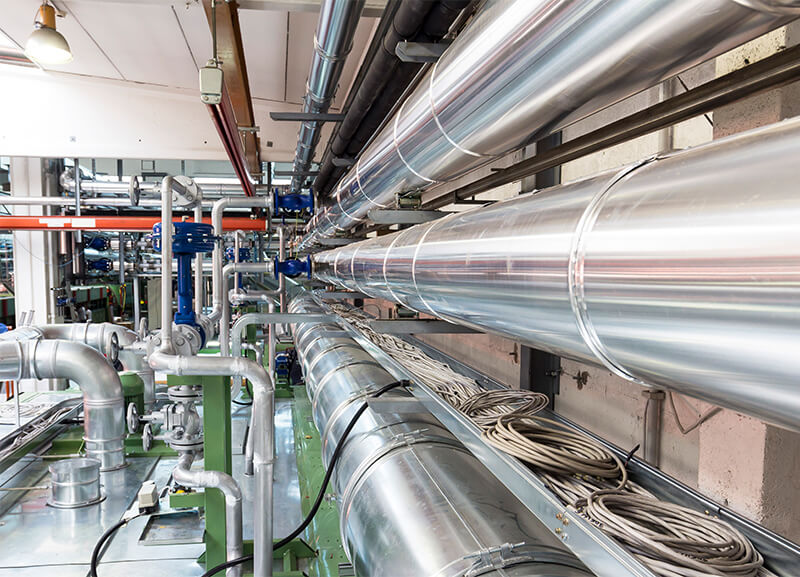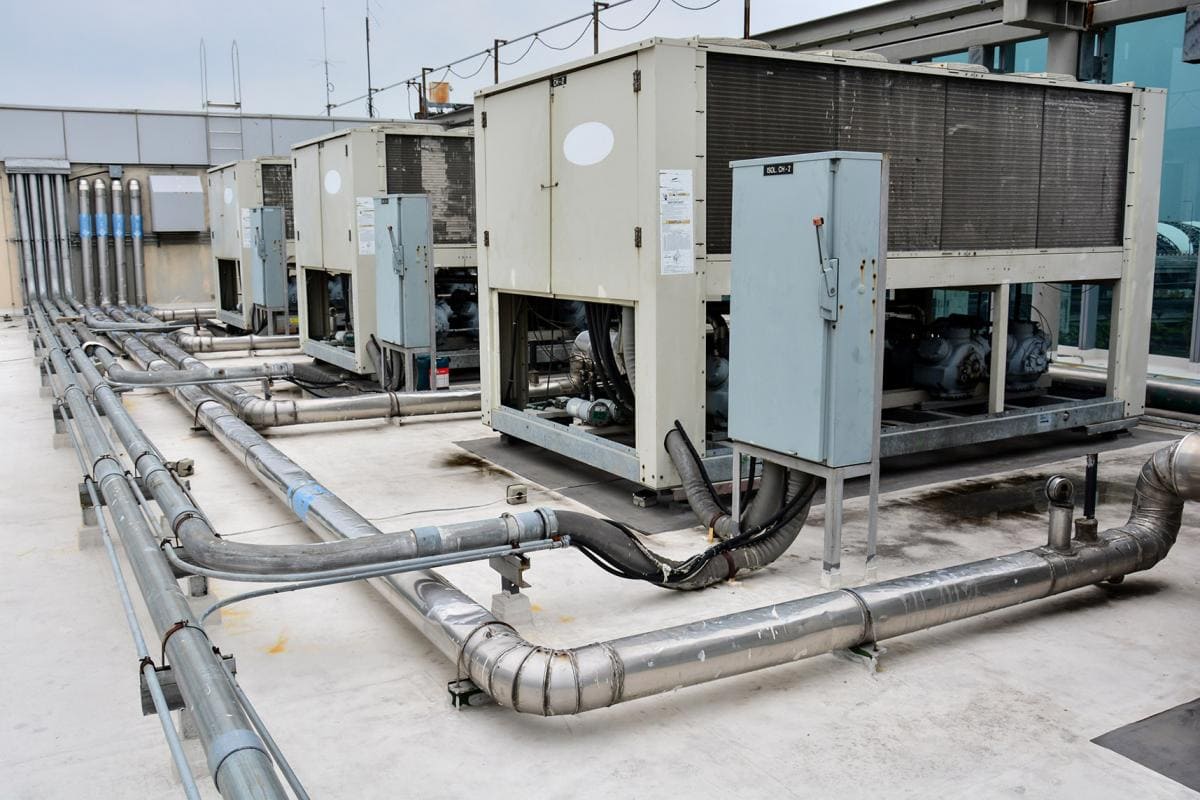See how HVAC experts help maintain sustainable systems in every climate
Exploring the Essential Elements of an Efficient Cooling And Heating System
A reliable cooling and heating system is developed on a number of critical components that operate in consistency. Each component, from the thermostat to the ductwork, plays a crucial duty in maintaining comfort and energy efficiency. Recognizing these elements is crucial for optimizing efficiency and enhancing indoor air high quality. As one takes a look at these parts, the intricate partnerships between them reveal insights into improving overall system performance. What details factors contribute most to this effectiveness?
The Duty of the Thermostat in Cooling And Heating Efficiency
Commonly neglected, the thermostat plays a crucial role in the effectiveness of A/c systems. This tiny gadget serves as the key control facility, managing temperature settings and making sure excellent comfort within a space. By accurately picking up the ambient temperature level, the thermostat interacts with the home heating, air, and ventilation conditioning units to keep the wanted environment
A reliable thermostat reduces energy usage by turning on the a/c system only when essential, therefore preventing too much heating or air conditioning. Modern clever and programmable thermostats improve this performance better by permitting customers to set timetables and from another location adjust settings, adapting to daily regimens.
The placement of the thermostat is vital; improper location can lead to inaccurate temperature analyses, resulting in inefficient procedure. Generally, a well-functioning thermostat not only improves comfort yet also contributes noticeably to power cost savings and the long life of the a/c system.
Recognizing the Value of Air Filters
Air filters serve an important feature in cooling and heating systems by guaranteeing that the air circulating within a space stays healthy and tidy. These filters trap dirt, irritants, and other contaminants, preventing them from being recirculated throughout the atmosphere. By capturing these fragments, air filters contribute to boosted interior air top quality, which can considerably benefit residents' health and wellness, specifically those with allergic reactions or respiratory system problems.
Furthermore, maintaining clean air filters boosts the effectiveness of heating and cooling systems. Clogged filters can restrict airflow, causing the system to work harder to keep desired temperatures, causing boosted energy consumption and greater utility expenses. On a regular basis changing or cleaning filters is an essential upkeep action that can lengthen the lifespan of heating and cooling tools. Inevitably, comprehending the relevance of air filters enables home owners and structure supervisors to take proactive actions to assure a well-functioning, efficient HVAC system that promotes a risk-free and comfy indoor atmosphere.

The Capability of the Heating System and Warmth Pump
Furnaces and warm pumps are essential elements of cooling and heating systems, in charge of offering warmth throughout cooler months. Heating systems run by heating air through combustion or electric resistance, after that distributing it throughout the home by means of ducts. They normally use quick home heating and can be sustained by gas, power, or oil, depending on the system type.
Conversely, heatpump transfer warm rather than generate it. They extract warm from the outdoors air or ground, also in reduced temperatures, and transfer it inside your home. HVAC experts. This double capability allows heat pumps to likewise supply cooling in warmer months, making them versatile options for year-round climate control
Both systems require proper maintenance to guarantee efficiency and longevity. While furnaces excel in extreme cold, heatpump can be beneficial in moderate climates. Recognizing their distinct functionalities help homeowners in choosing the most appropriate alternative for their home heating needs.
Discovering the A/c System
The air conditioning system is an essential part of a/c systems, available in numerous types to fit different demands. Recognizing the performance rankings of these units is crucial for making informed options concerning energy usage and expense. This area will certainly explore the varied sorts of a/c and make clear exactly how effectiveness ratings effect performance.
Kinds of Air Conditioners
While different factors affect the option of air conditioning systems, recognizing the different types readily available is vital for house owners and building supervisors alike. Central air conditioners are made to cool whole homes or buildings, making use of a network of ducts for airflow. Home window units supply an even more localized remedy, ideal for solitary rooms or tiny areas. Mobile air conditioners supply flexibility, permitting individuals to move the device as needed. Ductless mini-split systems are one more option, integrating the efficiency of main systems with the comfort of zoning, as they require no ductwork. Geothermal systems harness the earth's temperature level for energy-efficient cooling. Each kind comes with distinctive benefits, making educated choices important for effective climate control.

Performance Scores Explained
Comprehending efficiency scores is vital for selecting the appropriate air conditioning system, as these metrics provide insight right into the system's efficiency and energy usage. One of the most common score for ac system is the Seasonal Power Performance Ratio (SEER), which gauges the cooling output during a typical cooling period separated by the complete electric energy input. A greater SEER shows far better efficiency. Furthermore, the Power Performance Proportion (EER) is used for determining performance under specific conditions. An additional vital metric is the Energy Star qualification, which represents that a system satisfies rigorous power efficiency guidelines. By examining these rankings, customers can make informed choices that not only maximize comfort yet likewise decrease power expenses and ecological effect.
The Relevance of Ductwork and Air movement
Reliable ductwork layout and air flow administration play essential roles in the overall efficiency and performance of heating and look what i found cooling systems. Appropriate ductwork assurances that conditioned air is distributed evenly throughout a space, reducing temperature fluctuations and enhancing convenience. Properly designed air ducts lessen resistance to air movement, minimizing the workload on a/c tools and eventually decreasing power usage.
Air flow administration includes tactically placing vents and registers to enhance the circulation of air. This stops usual concerns such as warm or cool areas, which can happen when air flow is obstructed or inadequately balanced. In addition, the appropriate air duct products and insulation can even more enhance efficiency by reducing heat loss or gain throughout find air transit.
A reliable ductwork system not only adds to power cost savings but can likewise prolong the life-span of HVAC devices by decreasing unneeded stress (HVAC experts). Subsequently, recognizing the importance of ductwork and air flow is crucial for accomplishing peak HVAC system efficiency
Regular Maintenance Practices to Improve Efficiency
Regular maintenance techniques are vital for ensuring peak performance of HVAC systems. These methods include regular assessments, cleansing, and necessary repair work to maintain the system running efficiently. Consistently changing air filters is important, as stopped up filters can block airflow and decrease effectiveness. Furthermore, specialists must check and tidy evaporator and condenser coils to avoid overheating and power wastage.
Yearly professional inspections are additionally advised, as skilled professionals can identify prospective problems prior to they intensify. Oiling relocating parts minimizes wear and tear, adding to a longer lifespan for the system. Furthermore, ensuring that the thermostat functions appropriately aids in maintaining ideal temperature control.

Often Asked Inquiries
Just how Usually Should I Change My Thermostat?
Thermostats should typically be replaced every 5 to 10 years, depending on use and technology advancements. Regular checks are suggested to guarantee peak efficiency, specifically if experiencing irregular temperature level control or boosted energy expenses.
What Size Air Filter Is Best for My Heating And Cooling System?
The finest dimension air filter for a cooling and heating system differs by system style. Normally, it's crucial to get in touch with the proprietor's handbook or inspect the existing filter measurements to assure peak efficiency and air high quality.
Can I Set Up a Heatpump Myself?
Setting up a heatpump individually is possible for experienced individuals, however it needs understanding of regional codes and electrical systems. Hiring a professional is recommended to ensure proper installation and perfect system performance.
Just how Do I Know if My Ductwork Is Effective?
To identify ductwork performance, one ought to examine for leaks, measure air movement at vents, check insulation top quality, and review temperature level distinctions between supply and return air ducts. Specialist analyses can offer comprehensive understandings right into overall efficiency.
What Are Indications My Heating And Cooling Demands Immediate Maintenance?
Indications that a heating and cooling system requires immediate maintenance consist of unusual noises, irregular temperatures, boosted energy expenses, undesirable odors, and constant cycling. Attending to these issues without delay can stop further damages and assurance optimal system efficiency.
Air filters serve a vital function in HVAC systems by guaranteeing that the air flowing within an area remains tidy and healthy. In addition, maintaining clean air filters improves the performance of HVAC systems. Ductless best site mini-split systems are one more choice, incorporating the efficiency of central systems with the ease of zoning, as they require no ductwork. Comprehending performance ratings is crucial for picking the right air conditioning unit, as these metrics offer insight into the system's efficiency and power intake. The best size air filter for a HVAC system differs by device layout.